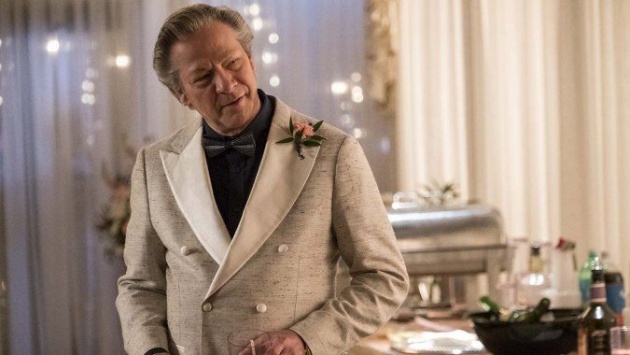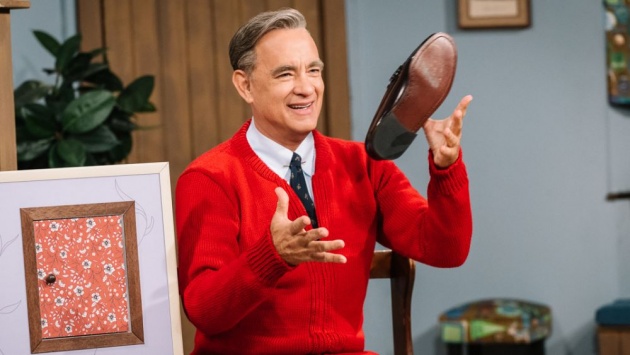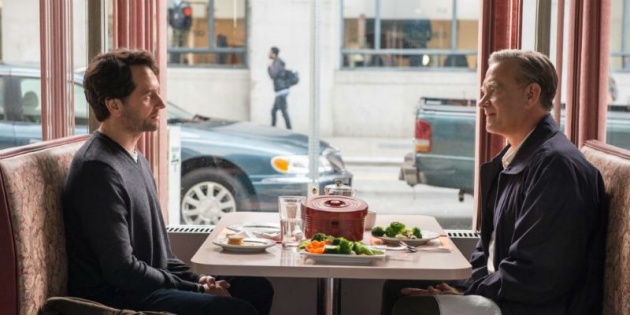Pictured: That shoe has never been worn in the real world. Tom Hanks plays Fred Rogers in the fiction film, 'A Beautiful Day in the Neighborhood', written by Micah Fitzerman-Blue and Noah Harpster and directed by Marielle Heller. Still courtesy of Tri Star / Sony Pictures
At time of writing (February 8th, 2020) in earnings, Little Women adapted and directed by Greta Gerwig, has passed the $100 million mark at the US box office. This is a big deal, since films without a major star in the leading role or not based on a franchise with a loyal fan base rarely reach this total. Little Women joins Hustlers as two films directed by women that have earned over $100 million on their initial cinema release in the US in the twelve-month period beginning September 1st, 2019. When five films directed by women reach this total in a twelve-month period, the commercial test would have been passed. Women directors would have proved themselves just as capable as men of delivering box-office, ‘must see’ entertainment. The next landmark will be for two women or more to be nominated by their peers as Best Director at the Oscars in the same year, something I probably won’t see – but nevertheless hope for – in the writing of this blog.
Tom Rothman, Chairman of Sony Pictures Entertainment Motion Pictures Group took a risk, but nevertheless a savvy one, in greenlighting three productions directed by women released in the US in 2019: Charlie’s Angels (sadly a flop), Little Women and the riskiest of all, A Beautiful Day in the Neighborhood, a fictional film inspired by journalist Tom Junod’s profile ‘Can you say… hero?’ of children’s television host Fred Rogers, published in Esquire Magazine in November 1998. Tell a studio executive that you want to make a biography of Mister Rogers and then show them a photograph so there is no confusing him with cowboy star Roy Rogers, you might field the question, ‘what did he do?’ ‘He entertained children with puppets and talked to them through the camera about difficult stuff and won three daytime Emmy awards and sang songs including the theme of his own show,’ you might answer. ‘But what did he change?’ The question is like an accusation. Mister Rogers impact was very personal. He was a great explainer who used puppets to represent children’s curiosity and their struggle to understand the ways in which adults interacted. He probably defined the phrase, ‘teachable moment’.
The screenwriters Micah Fitzerman-Blue and Noah Harpster answer the question by turning the journalist interviewing Mister Rogers into the protagonist. Tom Junod is replaced by the fictional Lloyd Vogel (Matthew Rhys), a new father with unresolved issues concerning his own dad. Cynical journalist Lloyd has a difficulty with forgiveness. I am not going to say whether Mister Rogers as expertly portrayed by Tom Hanks teaches Lloyd (Matthew Rhys) to let go of his anger or indeed how the lesson is delivered, but this is the crux of the movie.
If you were to identify the perfect director for this subject, you might hire Spike Jonze (Where the Wild Things Are) or Michel Gondry (Be Kind Rewind). Both directors have worked with puppets and blended an artificial and realistic aesthetic. However, the studio chose Marielle Heller. Her previous two films, The Diary of a Teenage Girl and Can You Ever Forgive Me, have given her the tag of a director who makes films about writers.
Heller does the Jonze/Gondry puppetry stuff just fine. This is a film that turns the Tri-Star [studio] anthem into a tune that would lull a new-born to sleep. It opens with a toy cityscape representing Pittsburgh where Mister Rogers tapes his show. Mister Rogers – his wife, Joanne (Maryann Plunkett) calls him ‘Rodge’ – enters through the front door and trades a suit jacket for a cardigan, then removing his outdoor shoes. The transformation is important because he represents the man of the house switching roles from ‘breadwinner’ to ‘dad’. There is an anomaly. Mister Rogers is singing, ‘it’s a beautiful day in the neighbourhood’, that is, the start of something. If he has just been to work, how is this so? In effect, when he enters ‘home’, he is turning back the clock to the morning and to his childhood self, the one that enters ‘a magical world of make believe’. It should also be noted that Mister Rogers takes his puppets with him when he travels, where you or I might take underwear. You can’t use underwear to enter a magical world of make believe, let me tell you.
Pictured: Lloyd (Matthew Rhys) has lunch with Fred Rogers (Tom Hanks) and gets the silent treatment in 'A Beautiful Day in the Neighborhood', a fiction film directed by Marielle Heller. Still courtesy of Sony Pictures (Tri Star)
Fitzerman-Blue and Harpster take the best of Junod’s observations and give them an emotional and narrative context in fiction. At one point, in both the article and the film, Mister Rogers asks a dying man to pray for him, observing that the man is closer to God than he [Mister Rogers] is. It is a gesture that makes you marvel.
The opening is a pastiche of Mister Rogers’ show, down to the opening of windows showing Lady Aberlin (Maddie Corman), a visitor to the neighbourhood, and the mailman, Mr McFeely (Daniel Krell). ‘He always says, ‘speedy delivery’,’ Mister Rogers reminds his viewers. Then, he opens another flap on his ‘wall’ to reveal a picture of Lloyd, the bridge of whose nose is bloodied. It is a picture disturbing to a child, but no child is watching – we are. We then meet Lloyd at an awards ceremony, where he describes journalists as ‘fellow misfits.’
Lloyd, we discover, has just been invited to his sister’s third wedding. The groom is Todd, played by co-writer Harpster. When he hears from his wife, Andrea (Susan Kelechi Watson) that his sister Lorraine (Tammy Blanchard) has invited his father, Jerry (Chris Cooper) to the ceremony, Lloyd wants to skip it. ‘What’s the point of having a baby if you can’t use it to avoid social occasions?’ he asks rhetorically. Of course, Lloyd doesn’t dodge the wedding, but he has daddy issues of his own, floundering when trying to install a child’s car seat in the back of a cab. Passing him baby Austin to hold, Andrea fastens it with ease.
They travel through a toy New York cityscape (complete with Twin Towers) to the wedding venue where Jerry is walking Lorraine down the aisle. He shoots a little gesture of ‘catch you later’ to Lloyd, making the seasoned journalist wince. At the wedding dinner, Jerry performs a song for the newly-weds, ‘Something Stupid’. It is an embarrassing dad’s performance, that doubly makes Lloyd wince when Jerry points to him and croons, ‘I love you’. At the reception, Jerry sidles up to Lloyd and his family, drink in hand. ‘Can you give us a moment, doll?’ he asks Andrea. ‘She’s not a doll, she’s a Public Interest Attorney,’ snaps Lloyd. When Jerry mentions Lloyd’s mother – ‘she wasn’t a saint’ – Lloyd lets fly, resulting in the injury that we see at the film’s opening. ‘You were out of control in there,’ Andrea admonishes Lloyd. ‘You should make amends.’ ‘I am making amends. I offered to pay for Lorraine’s dry cleaning,’ Lloyd replies. The dialogue has a situation comedy finesse.
 Pictured: 'Have a drink with me.' Jerry (Chris Cooper) has something to say in 'A Beautiful Day in the Neighborhood', a fiction film inspired by Tom Junod's article, 'Can you say... hero?' and directed by Marielle Heller. Still courtesy of Sony Pictures (Tri Star)
Pictured: 'Have a drink with me.' Jerry (Chris Cooper) has something to say in 'A Beautiful Day in the Neighborhood', a fiction film inspired by Tom Junod's article, 'Can you say... hero?' and directed by Marielle Heller. Still courtesy of Sony Pictures (Tri Star)
Back in his studio, talking to us, Mister Rogers hears a knock at the door. It’s the mailman, Mr McFeely. ‘Speedy delivery,’ he exclaims. Mr McFeely has brought a video cassette that explains how magazines are made. Do we want to see it? ‘Let’s watch it on Picture Picture.’ Mister Rogers leads us to an imitation Vincent Van Gogh painting, that is raised to reveal a television screen. Yes, reader, we do learn how magazines are made. Mister Rogers remarks that the ink looks like mustard. We see the people who write for the magazines and plan its design. We then see Lloyd heading to the office of his editor, Ellen (Christine Lahti). She is preparing an issue of Esquire Magazine on heroes and commissions Lloyd to write 400 words on Fred Rogers. ‘You hired me as an investigative journalist. This is not what I do,’ Lloyd complains. ‘I hired you as a writer. Now write.’ She tells him Fred Rogers is the only hero who agreed to be interviewed by Lloyd. ‘People like me,’ Lloyd counters. ‘They like you, then they read what you write about them,’ Ellen tells him. When Andrea hears about Lloyd’s new assignment, she pleads, ‘please don’t ruin my childhood’.
The rest of the film describes the interactions between Lloyd and Fred: their initial telephone conversation when Lloyd returns home to a house full of babies (and their mothers); Lloyd’s trip to Pittsburgh where he attends a recording of the show; and a meeting in New York where Mister Rogers is also filming, watching female musicians by plucking the strings of their instruments, a pizzicato. At the same time, Lloyd avoids his father who is very eager to talk to him.
The film shows Fred welcoming visitors to his neighbourhood before every recording, children accompanied by their parents, sometimes very awkward. One sickly young boy doesn’t acknowledge Mister Rogers but swings his toy sword back and forth, hitting the leg of his father. Mister Rogers talks to him in a steady, patient voice. ‘That sword must be very heavy. You must be very strong. On the outside and on the inside.’ As if a spell had been broken, the boy drops the sword and hugs Mister Rogers. ‘Can I take your picture?’ he asks the family group. ‘I like to take pictures of everyone who visits the neighbourhood.’ You might think: what is he, the CIA? But Fred likes his own reminder of what he does. He curves his back as he takes the photograph. Then he acknowledges Lloyd.
Fred, we discover, is easily distracted. He also likes his own foolishness, as when he introduces his next activity. ‘This is a tent. Let’s put it up.’ Mister Rogers struggles unsuccessfully to press down on the top of the tent so that it pops into shape. ‘Perhaps this is a two-person tent,’ he concludes. The director isn’t sure about the scene, but Mister Rogers likes it. ‘It is a reminder that adults can’t always do things.’
You might conclude that Mister Rogers – and the film – is a bit patronising. However, it is wholeheartedly sincere. In fact, it dials down on some of Fred’s behaviour, notably his calls to prayer. Fred isn’t like anyone Lloyd has ever met. In a restaurant, he invites Lloyd to join him in a minute of silence. The restaurant’s other patrons join in. The scene takes thirty seconds to watch. It concludes with Fred thanking Lloyd. Whenever Lloyd tries to get behind Mister Rogers’ public persona, Fred deflects. When Lloyd remarks that it must have been a burden on his two sons to grow up with such a famous father, Fred agrees and thanks him for his observation. In another scene, taken straight from the article, Fred asks Lloyd about his favourite toy growing up. ‘Old Rabbit,’ Lloyd explains. Adopting the voice of the shiest of his puppets, Fred remarks, ‘I’d like to meet Old Rabbit,’ a line that might just reach cult status. At his most troubled, Lloyd finds himself invited into Mister Rogers television and addressed by a puppet - not King Friday the 13th, though.
Mister Rogers has something in common with two of Hanks’ other performances: Forrest Gump and Walt Disney (he played the latter in Saving Mr Banks). Fred, like Forrest and Walt, lives in a bubble of optimism, certain of his own opinion, trusting in his own instincts. Hanks has often been incorrectly described as an everyman, only capable of ordinary bravery. His best performances, of which this is one, show that he has arrived at some inner peace. He has more in common with Jeff Bridges than any other Hollywood actor – minus the gruff delivery.
Fred is indulged like a child, frustrating his director. He has a minder of sorts, Bill Isler (Enrico Colantoni) who is protective of him. ‘Fred likes everybody,’ Bill tells Lloyd, ‘but he likes people like you the best.’ ‘People like me?’ ‘Broken people.’ When Lloyd mentions this to Fred, he replies, ‘I don’t think you’re broken.’ Fred never tells people the truth, rather offers a version of themselves that they would like to believe in. This is a familiar technique used by politicians, but Fred isn’t asking for a vote. His enthusiasm is unconditional.
A Beautiful Day in the Neighborhood doesn’t have a big cathartic finish. Instead it leaves us with an image of Fred Rogers alone, hitting a bunch of piano keys. We don’t know what it costs him to spread happiness – but it costs him something. The ending is spoilt by a poor piece of shoe continuity. We see Mister Rogers conclude his show and take off his indoor shoes. Yet when he is on the other side of his front door, he has his outdoor shoes on. However, this imperfection is okay. Just as the film explores forgiveness, so we forgive its flaws.
The film won’t join Hustlers and Little Women in the $100 million club. However, its $61 million gross to date since its release in November 2019 is respectable. Mister Rogers isn’t an icon outside of the United States; even with its unabashed optimism, the film doesn’t appeal to international audiences, lasting only a week in UK cinemas. Heller, a former actress, proves herself an actor’s director. Melissa McCarthy earned an Oscar nomination in Heller’s last film, Can You Ever Forgive Me just as Tom Hanks has earned one for this. Heller’s three films are all tonally different, showing her range. She has proven herself, earning her next shot at a major Hollywood film.
Reviewed at Cineworld West India Quay, East London, Tuesday February 4th, 2020. 17:00 screening





